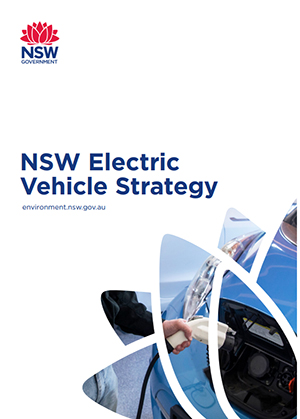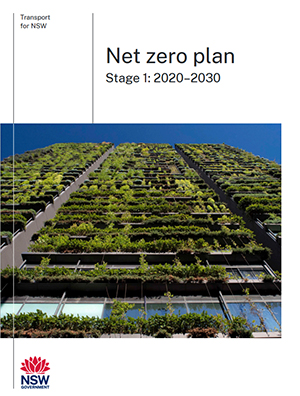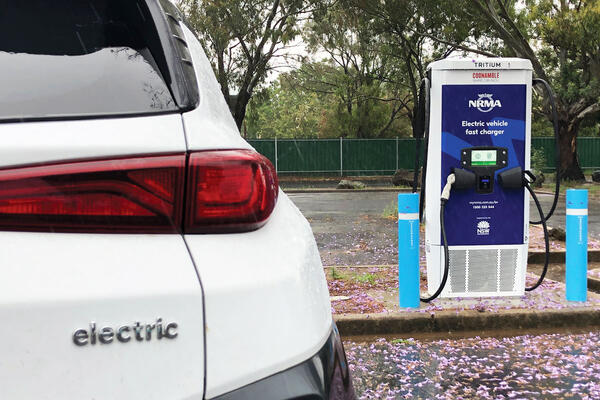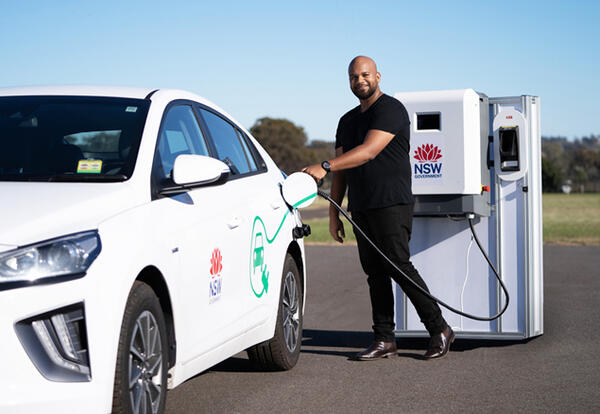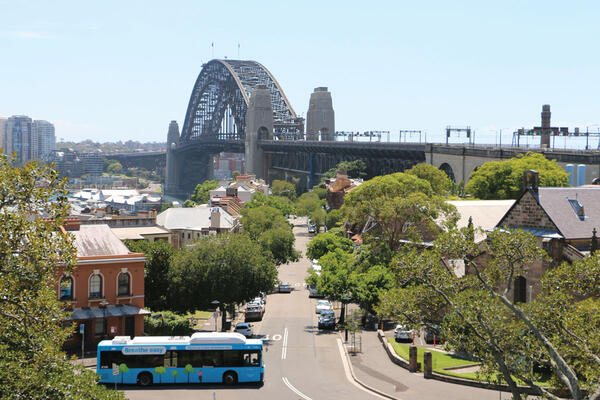
What are we doing?
The NSW Government are working with industry and community to enable the transition to electric vehicles (EVs).
Our Electric Vehicle Strategy sets out our commitment to implement and leverage electric vehicle technology and transport.
As of 2023, the state government will invest over $209m to build an EV charging network that will:
- Enable EV super-fast charging, destination charging, and kerbside charging infrastructure
- Provide support to drivers and fleet owners planning to purchase EVs
- Ensure buildings are EV ready by supporting the development of Australian standards for commercial and residential EV charging.
This investment is a multi-government agency commitment, with key actions being supported by the NSW Department of Climate Change, Energy, the Environment and Water (DCCEEW), NSW Treasury, and Transport for NSW.
The EV strategy is one part to help NSW achieve net zero by 2050. Many plans have been developed to support the NSW EV transition – these are listed below.
Electric vehicle plans and strategies
NSW Electric Vehicle Strategy
The NSW Electric Vehicle Strategy defines the state government’s plan to increase the uptake of electric vehicles and help achieve net zero emissions by 2050.
The state government aims to achieve this goal through the following actions:
- Building an EV charging network to make charging more accessible
- Making it easy to drive an electric vehicle by allowing the use of transit lanes until June 2025
- Creating new EV-related jobs and growing the economy
- Keeping road funding fair and sustainable.
The NSW Electric Vehicle Strategy is regularly reviewed to ensure state outcomes are realised.
For more information visit: NSW Government’s Electric Vehicle Strategy | NSW Government
Net Zero Plan Stage 1: 2020-2030
The Net Zero Plan Stage 1: 2020-2030 outlines the NSW Government’s approach to reaching zero net emissions by 2050.
One method of achieving net zero is the uptake of new technology that has been proven to reduce emissions. The state government plans to lead by example by:
- Increasing the target for electric or hybrid passenger vehicles to 30% by 2023, with at least 10% to be fully electric
- Replacing Sydney’s bus fleet with electric buses.
Learn more: NSW Climate and Energy Action website.
Transport for NSW electric vehicle programs and projects
Transport for NSW are working on multiple programs and projects to support the uptake of EVs in NSW.
Regional Fast Charger Program – NRMA Partnership
In partnership with the NRMA, Transport for NSW is supporting the installation of fast charging stations across regional NSW.
The electric vehicle fast charging network will deliver over 40 fast chargers in 25 sites throughout regional NSW, targeting major regional corridors and opening regional NSW to EV drivers.
The increase in electric vehicle charging infrastructure accommodates green and clean travel across NSW and into connecting States.
Learn more: Powering the regions: New Electric Vehicle charging points | The NRMA (mynrma.com.au)
Commuter Carpark Program – Jolt Partnership
Transport for NSW has partnered with JOLT to install 25kW DC EV chargers at commuter carparks throughout the Greater Sydney area.
More than 50 EV charging stations will be installed in car parks at popular transport hubs.
These additional charging bays will help close barriers to EV adoption and aid the movement towards sustainable transport.
Learn more: EV Charging Program.
Commuter Carpark Program – EV Charging Facilities
Transport for NSW are making public transport more accessible through the Commuter Carpark Program.
The Commuter Car Park Program provides drivers with more convenient access to public transport at key transport interchanges and helps to ease congestion on our roads.
The program will promote EV charging facilities in existing commuter car parks throughout Sydney metropolitan. Three carparks at Rooty Hill, Edmondson Park and Leppington have already been upgraded to incorporate EV charging infrastructure.
Learn more: Commuter Carpark Program
Electric Vehicle Signposting Standard
Transport for NSW is establishing the Electric Vehicle Signposting Standard (EVSS).
Currently, there is no policy in relation to the signposting of EV charging facilities in NSW. The creation of the EVSS will ensure that signposting practice for EVs is sustainable and meets customer needs.
The EVSS will:
- Outline eligibility of the sites for wayfinding signposting
- Provide regulatory guidance on permissive and restrictive parking control signs
- Provide examples of best practice wayfinding for business identification signage, internal site wayfinding, and standard pavement markings.
Zero Emission Buses
Transport for NSW is transitioning the fleet of more than 8,000 diesel and natural gas public transport buses to zero emission technology.
The current bus fleet contributes to over 75% of Transport for NSW total emissions. The change to electric vehicle technology will support the state government initiative towards net zero emissions by 2050.
Learn more: Zero Emissions Buses | Current Projects
Electric Vehicle Fleets
The NSW Government aims to lead by example and target an all-electric passenger vehicle fleet procurement by 2030.
This fleet target will stimulate the second-hand vehicle market with electric vehicles being sold after three to five years.
Learn more: Electric Vehicle Strategy | NSW Climate and Energy Action
More information:
Charging an electric vehicle
Find out how to charge an electric vehicle and how long it takes
Available electric vehicles
View all of the battery electric vehicles (BEVs) and plug-in hybrid vehicles (PHEV) currently available in Australia

